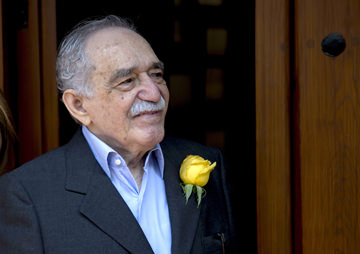Colombian Nobel Laureate, Author and Journalist Gabriel García Márquez Dies at 87
The writer, who is considered by many to be the creator of magical realism, died Thursday in Mexico where he'd lived for 30 years. The Latin American author was affectionately called Gabo by his many admirers. (AP/Eduardo Verdugo)
The Latin American author was affectionately called Gabo by his many admirers. (AP/Eduardo Verdugo)
The writer, who is considered by many to be the creator of magical realism, died Thursday in Mexico where he’d lived for 30 years. The announcement of his death, made on Twitter by a family spokesperson, comes after news of his recent hospitalization for lung and urinary tract infections.
García Márquez won the Nobel Prize in Literature in 1982 and is best known for his masterpiece “One Hundred Years of Solitude,” a work poet Pablo Neruda called “the greatest revelation in the Spanish language since ‘Don Quixote.’ ”
His magnificent oeuvre filled with “storms [that] rage for years, flowers drift[ing] from the skies, tyrants surviv[ing] for centuries, priests levitat[ing], and corpses fail[ing] to decompose” has taken its rightful place in the international literary canon. His work touched on themes as universal as inequality, violence and love, while reimagining the world in ways that created excitement while offering profound insight into human existence.
And yet, the critically acclaimed novelist and short story writer once said in an interview with The Paris Review, “I would have liked for my books to have been recognized posthumously, at least in capitalist countries, where you turn into a kind of merchandise.” Those he moved during his lifetime with his extraordinary tales that resonated with so many people flung across various corners of this earth (even those living in countries that epitomize capitalism) can be thankful his writing was too good to leave him a choice in the matter.
The New York Times:
Magic realism, he said, sprang from Latin America’s history of vicious dictators and romantic revolutionaries, of long years of hunger, illness and violence. In accepting his Nobel, Mr. García Márquez said: “Poets and beggars, musicians and prophets, warriors and scoundrels, all creatures of that unbridled reality, we have had to ask but little of imagination. For our crucial problem has been a lack of conventional means to render our lives believable.”
…Mr. García Márquez made no claim to have invented magic realism; he pointed out that elements of it had appeared before in Latin American literature. But no one before him had used the style with such artistry, exuberance and power. Magic realism would soon inspire writers on both sides of the Atlantic, most notably Isabel Allende in Chile and Salman Rushdie in Britain.
Suffering from lymphatic cancer, which was diagnosed in 1999, Mr. García Márquez devoted most of his subsequent writing to his memoirs. One exception was the novel “Memories of My Melancholy Whores,” about the love affair between a 90-year-old man and a 14-year-old prostitute, published in 2004.
—Posted by Natasha Hakimi Zapata
Your support matters…Independent journalism is under threat and overshadowed by heavily funded mainstream media.
You can help level the playing field. Become a member.
Your tax-deductible contribution keeps us digging beneath the headlines to give you thought-provoking, investigative reporting and analysis that unearths what's really happening- without compromise.
Give today to support our courageous, independent journalists.






You need to be a supporter to comment.
There are currently no responses to this article.
Be the first to respond.